Pope Francis

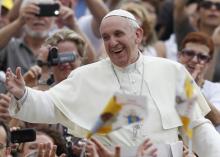
Once again breaking with traditional Vatican protocol, Pope Francis on Wednesday penned a long letter to the Italian liberal daily La Repubblica to affirm that an “open dialogue free of prejudices” between Christians and atheists is “necessary and precious.”
Francis’ front-page letter was a response to two open letters published in previous months by Eugenio Scalfari, the founder of La Repubblica and an avowed atheist.
The pope’s letter is especially notable for its open and honest assessment of the spiritual state of nonbelievers. And for an institution that long claimed sole jurisdiction on matters of salvation, Francis seems to open the door to the idea that notions of sin, conscience and forgiveness are not the exclusive domain of the Catholic Church.
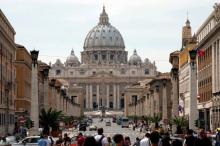
Pope Francis met for three hours with the heads of all Vatican departments on Tuesday, Sept. 10, signaling his desire to introduce more collaboration and transparency in the traditionally secretive and top-heavy governance style of the Catholic Church.
About 30 people attended, including the heads of the Vatican’s eight congregations and 12 councils, as well as top officials from the church’s tribunals and from the administration of Vatican state.
Cardinal Tarcisio Bertone, the Vatican’s outgoing secretary of state, also participated, in one of his last official engagements before his successor, Archbishop Pietro Parolin, takes over on Oct. 15.
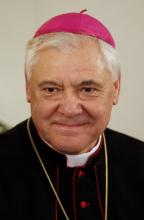
A progressive theological current that emphasizes the Catholic Church’s closeness to the poor and the marginalized but was subject to decades of hostility and censure is now finding increasing favor in the Vatican under Pope Francis.
Francis, who has called for “a poor church for the poor,” will meet in the next few days with the Rev. Gustavo Gutierrez, a Peruvian theologian and scholar who is considered the founder of liberation theology.
The meeting was announced on Sunday, Sept. 8, by Archbishop Gerhard Ludwig Mueller, prefect of the Congregation for the Doctrine of the Faith, the Vatican’s doctrinal watchdog, during the launch of a book he co-authored with Gutierrez.
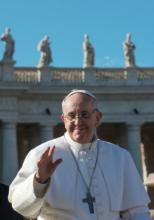
VATICAN CITY — Of all the novelties that Pope Francis has brought to the Vatican, few have endeared him to the public — and unsettled his aides — as much as his penchant for picking up the phone and calling someone out of the blue.
The pontiff with the pastor’s touch has phoned his cobbler in Argentina to inquire about a shoe repair, called to cancel his newspaper subscription, and phoned a woman who was raped by a local police officer to counsel her.
Just this week, Francis phoned a pregnant Italian woman whose fiancé had pushed her to have an abortion.
Anna Romano instead dumped the guy, wrote to the pope about her problems, and on Sept. 3 received a surprise call from the Holy Father, who offered encouragement and even said he would baptize the baby if she couldn’t find a willing priest.
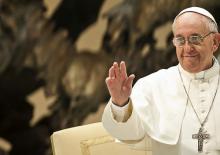
We learned the story in Sunday School.
Jesus and his inner circle — Peter, the rock, and James and John, the sons of thunder — came down from the Mount of Transfiguration and found the disciples facing their own inability to cast an unclean spirit out of a young boy. Annoyed with the disciples, Jesus says to the father: “If you believe, all things are possible to him who believes.” (Mark 9:23) The father replies: “Lord, I believe; help my unbelief.” (Mark 9:24) Jesus casts out the unclean spirit. Later, when the disciples ask why they were unable to do it, Jesus says that some only come out through prayer and fasting.
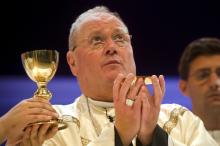
Cardinal Timothy Dolan, archbishop of New York, president of the U.S. Conference of Catholic Bishops, and the most famous funny man in the American hierarchy, went on The Colbert Report Tuesday night to trade quips with another funny guy — and another well-known Catholic — host Stephen Colbert.
Indeed, as Colbert — inhabiting his onscreen persona as a blowhard rightwing pundit — said in welcoming Dolan: “You’re the second most famous Catholic in America – after myself.”
But it was actually Dolan who got the first gag, and giggles, as he walked onto the set and ostentatiously bowed and kissed Colbert’s hand as if he were greeting the pope.
“I’ve got to get a nice big ring if you’re going to be kissing my hand!” replied Colbert, who seemed — uncharacteristically — unsure of how to play the exchange.
In fact, while Colbert was in full faux bloviating mode, he seemed to let Dolan set the pace of their chat; Colbert didn’t poke too hard on topics that could have prompted controversy.
Part of the relative deference may stem from the fact that Colbert is a serious Catholic who has taught Sunday school at his New Jersey parish. Or perhaps it was because Colbert knows Dolan personally, having appeared — out of character — at a forum on faith and humor last year at Fordham University. Or maybe Colbert was a bit out of practice: This was his first show after a two-week summer break, part of which he spent in Rome.
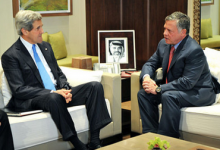
Pope Francis and Jordan’s King Abdullah II reaffirmed that dialogue is the “only option” to end the conflict in Syria, just as the United States and its European allies consider launching a military strike against the regime of President Bashar al-Assad.
The two leaders met for the first time on Thursday at the Vatican. The pontiff and the king, accompanied by his wife Queen Rania, talked in private for 20 minutes.
According to an official Vatican statement, during the meeting “special attention” was given to Syria’s “tragic situation.”
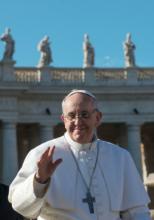
VATICAN CITY — Since mid-July, Pope Francis has been using Communion wafers made by an Argentine prisoner in the daily Mass he celebrates at the Vatican’s Santa Marta residence.
The hosts are made by Gabriela Caballero, a 38-year-old woman who is serving a seven-year jail term in the San Martin Penitentiary outside Buenos Aires.
Her story was revealed by the Argentine news agency NOVA and picked up by Il Sismografo, a blog with close connections to the Vatican.
Caballero gave the hosts, together with a long letter to the pope, to Bishop Oscar Ojea of San Isidro, who regularly visits the prison. Ojea, in turn, delivered the hosts to the pope on July 16 during a visit to the Vatican.
Francis began using the hosts on July 18; the day after he wrote back to Caballero, thanking her for the gift.
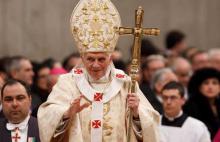
Pope Emeritus Benedict XVI resigned from the papacy because “God told me” to, according to a report by a Catholic news agency.
The Zenit news agency reported on Monday that Benedict decided to step back as a result of what he described as a “mystical experience” that shouldn’t be confused with a vision.
That experience sparked an “absolute desire” to dedicate his life exclusively to prayer, in a solitary relationship with God, Benedict reportedly said.
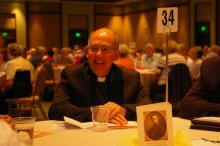
U.S. Catholic nuns — accused by Rome of “radical feminism” for advocating social justice at the expense of issues such as abortion, gay marriage, and euthanasia — responded to a Vatican knuckle rapping with a brief, conciliatory statement on Monday.
After its four-day annual assembly, the board of the Leadership Conference of Women Religious, which represents 80 percent of the nation’s 57,000 sisters, emphasized the positive, and remained tight-lipped about negotiations to resolve the investigation.

Schismatic Roman Catholic priests, who left the church to claim their right to marry, are now asking for an “African pope” to lead them.
The priests say they regret their former church is “allergic” to change. They believe priestly celibacy is neither rooted in the teachings of Jesus nor in the work of his apostles, who were married. And they insist celibacy does not work in an African context.
Former Zambian Archbishop Emmanuel Milingo who married a Korean acupuncturist in a 2001 celebration sponsored by the Unification Church and presided by its late founder, the Rev. Sun Myung Moon, serves as “African patriarch” of a number of church groups affiliated with his movement.
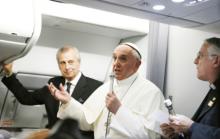
For more than three decades, the Vatican of Popes John Paul II and Benedict XVI operated on a version of the conservative maxim, “No enemies to the right.”
While left-wing theologians were silenced and liberal-to-moderate bishops were shunted aside in favor of hard-liners, liturgical traditionalists and cultural conservatives were diligently courted and given direct access to the apostolic palace.
But in a few short months, Pope Francis has upended that dynamic, alienating many on the Catholic right by refusing to play favorites and ignoring their preferred agenda items even as he stressed the kind of social justice issues that are near and dear to progressives.
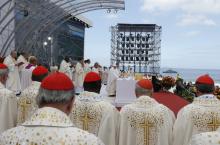
In the wake of Pope Francis’ triumphant visit to Brazil, writers for the rival National Catholic Register and National Catholic Reporter were left debating whether he’s “a gift to the church” or a “revolutionary.”
The Italian edition of Vanity Fair has named him Man of the Year. The Washington Post Wonkblog, of all places, quotes him in a post on forgiveness. Ross Douthat in The New York Times nods approvingly at a piece in The Telegraph that says Francis has “decontaminated the Catholic brand.”
And so on and so on.
Not bad for four months on the job.
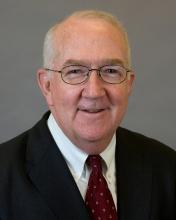
The U.S. Senate has confirmed former Catholic Relief Services head Ken Hackett to be the next ambassador to the Vatican.
Hackett replaces Miguel Diaz, a theologian, and he gives President Obama an experienced voice on social justice in Rome where a new pope, Francis, has made caring for the poor a priority.
Hackett’s confirmation came Thursday night by unanimous consent as senators wrapped up loose ends before the summer recess.
No opposition was expected since Hackett has strong ties to both parties; for five years he served on the board of former President George W. Bush’s Millennium Challenge Corporation and he is reported to be close to Denis McDonough, Obama’s chief of staff, whose brother is a priest.
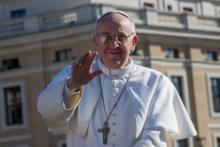
In message published on Friday, Pope Francis took the rare step of personally expressing his “esteem and friendship” to the world’s Muslims as they prepare to celebrate the end of the Ramadan fast.
While it is a long-established Vatican practice to send messages to the world’s religious leaders on their major holy days, those greetings are usually signed by the Vatican’s department for interfaith dialogue.
In his message, Francis explains that in the first year of his papacy he wanted to personally greet Muslims, “especially those who are religious leaders.”
Francis’ predecessor, Pope Benedict XVI, had fraught relations with Muslims. In a 2006 speech he quoted a Byzantine emperor who said Muhammad had only brought “evil and inhuman” things to the world, sparking a worldwide crisis in Christian-Muslim relations.
[T]HE MAJORITY OF THE men and women of our time continue to live daily in situations of insecurity, with dire consequences. ... One cause of this situation, in my opinion, is in our relationship with money, and our acceptance of its power over ourselves and our society. Consequently the financial crisis which we are experiencing makes us forget that its ultimate origin is to be found in a profound human crisis, in the denial of the primacy of human beings. We have created new idols. The worship of the golden calf of old (Exodus 32:15-34) has found a new and heartless image in the cult of money and the dictatorship of an economy which is faceless and lacking any truly humane goal. The worldwide financial and economic crisis seems to highlight the distortions and above all the gravely deficient human perspective, which reduces [people] to one of [their] needs alone, namely, consumption. Worse yet, human beings themselves are nowadays considered as consumer goods which can be used and thrown away. We have begun a throw- away culture. This tendency is seen on the level of individuals and whole societies; and it is being promoted ...
While the income of a minority is increasing exponentially, that of the majority is crumbling. This imbalance results from ideologies that uphold the absolute autonomy of markets and financial speculation, and thus deny the right of control to States, which are themselves charged with providing for the common good. ... I encourage the financial experts and the political leaders of your countries to consider the words of Saint John Chrysostom: “Not to share one’s goods with the poor is to rob them and to deprive them of life. It is not our goods that we possess, but theirs.”
POPE FRANCIS HAS created a new environment in the church. Beginning with asking all the people in St. Peter’s Square to bless him, living in a humble apartment and not the papal palace, placing his own phone calls, paying his own bills, giving simple daily homilies, having conversations with many people, and joyfully mingling with people: These all characterize an incredibly different pope. What has been even more attractive about Pope Francis than his style has been what he has said.
Pope Francis is clearly not on a mission to preserve the status quo. He’s been outspoken about the need for change in the world and in the church. In this he has not been a “professional denouncer.” Rather, he always contrasts what needs to change with the opportunity to be so much more than we are now. Whether it is oppressive global economic policy or clerical ambition, Pope Francis points out that we are called to something more noble and satisfying. The call of Christ is to be our best self. Francis reminds us, “God always forgives. Don’t forget this. God always forgives.”
Another striking aspect of Pope Francis is his constant and passionate concern for people who are poor and vulnerable and his reminder of our responsibilities to them. Whether he is talking to world leaders, bishops, or general audiences, his love of poor people and his firsthand knowledge of their challenges and how we should respond is profound.
RIGHT FROM THE beginning, John Carr saw Pope Francis as a “great sign of hope.”
Carr, who spent more than two decades as the U.S. bishops’ top peace and justice officer, was home, working at his kitchen table, when the white smoke came up announcing the selection of the new pope. “I thought, ‘Oh, my,’ and this guy I didn’t recognize came out,” Carr said. “When he said the name ‘Francis,’ I thought ‘it’s going to be okay.’”
As executive director of the Department of Justice, Peace, and Human Development at the U.S. Catholic bishops’ conference, Carr carried a rather large portfolio. He often tells the story of being introduced by a man who said, “He’s in charge of social development and world peace.” The man’s wife, in Carr’s telling, looked at him and said, “You need to do a better job.”
Since leaving the bishops’ staff last year, Carr has launched a new initiative, based at Georgetown University, aimed at helping lay people “become more informed and engaged in their vocation to be ‘salt, light, and leaven’” in public life. Carr, who visited Sojourners’ office this spring, is encouraged that the election of Pope Francis “has provided incredible visibility, urgency, and passion” around social issues. “When he was going to be elected, his friend said, ‘Don’t forget the poor,’” Carr explained. “A church that moves to the edge to care for the weak and vulnerable is a church you want to be a part of.”

For Catholics—and many others—what happens in Rome doesn’t stay in Rome. The seating of a new pope has the power to affect believers across the globe, in ways direct, indirect, and unpredictable. And when a surprising sea change occurs in a hide-bound, steeped-in-tradition place like the Vatican—the unexpected resignation of a pope, the selection of a Jesuit from the Americas as his replacement, and the powerful symbolism of a new leader who literally stoops to wash a Muslim woman’s feet—people of faith of all traditions sit up and take notice.
In these early days of Francis’ papacy, we asked three prominent Catholic thinkers and leaders to help us understand what it all might mean. How will the spirit of reform that has marked Pope Francis’ first few months in office affect the worldwide church? Will change at the top trickle down to parishes and neighborhoods here in the United States and elsewhere? And what will Francis’ leadership mean not only for Catholics, but for all people of faith engaged in the work of making justice and building peace? —The Editors
CATHOLICS AROUND THE WORLD are transfixed by Pope Francis. We love his simplicity of life, his humble faith, his welcoming attitude to all, and his way of being Christian in the contemporary world that takes its bearings from the poor. Lace and gilt are no longer fashion statements at the Vatican. From his small apartment, the pope speaks bluntly about worrying less about rules and more about love. An utterly refreshing breeze blows through the Catholic Church.
But what does it really mean for Catholics today? The church still reels with the moral and spiritual damage done by members of the clergy as perpetrators or accomplices in the sex abuse scandals, from fiscal mismanagement, and from institutional infighting. Does Pope Francis change that? And what does the new pope signify for the young, for women, and for the many issues that vex the church’s engagement in today’s world?